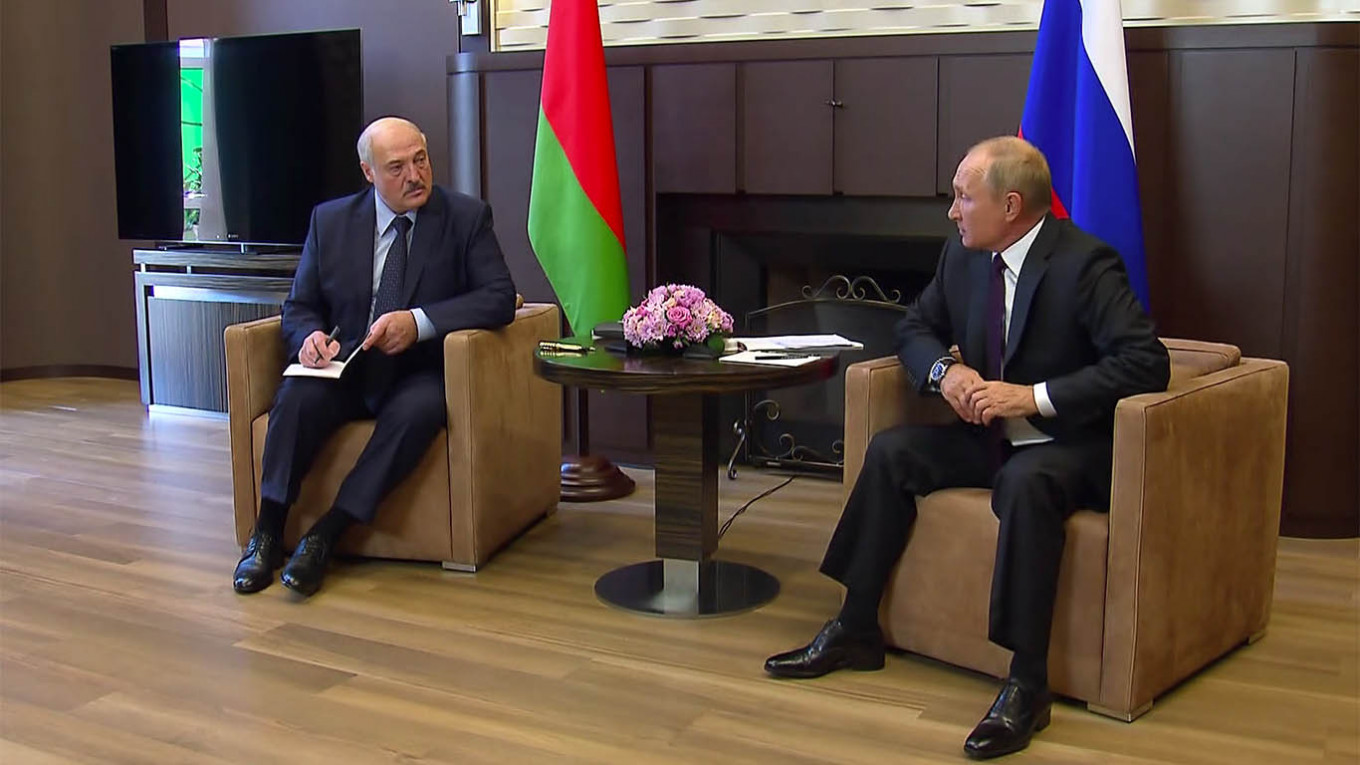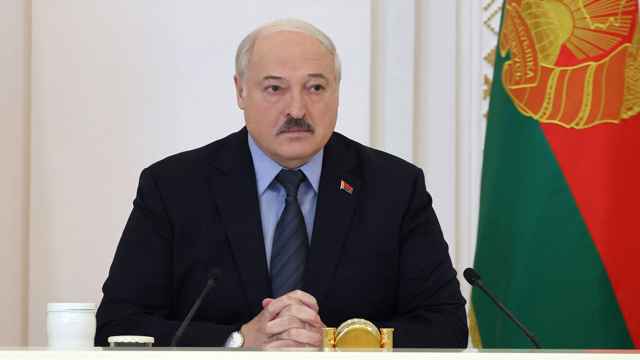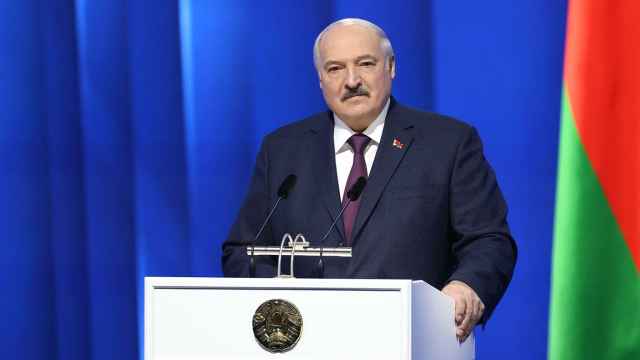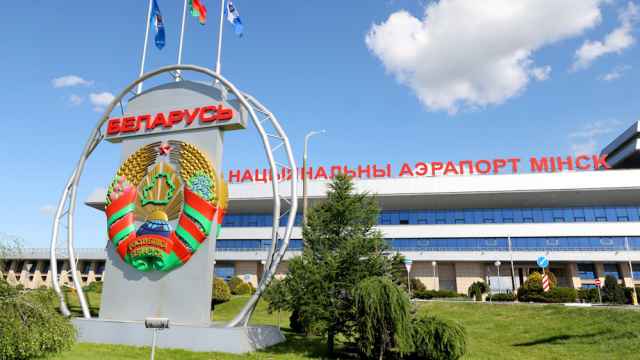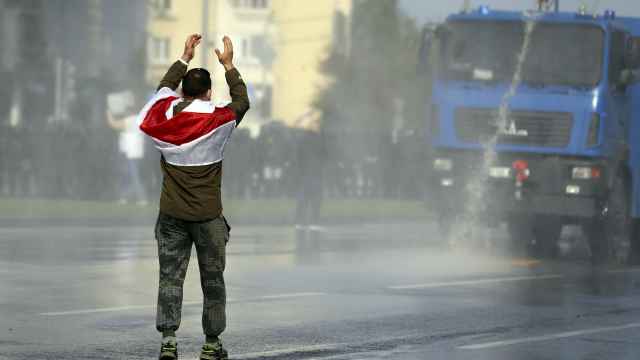Russia’s emergency $1.5 billion loan will do little to help Belarus’ embattled President Alexander Lukashenko prevent his economy from spiraling into crisis, analysts say.
Instead, the deal highlights Minsk’s deep reliance on financial and political support from Moscow, with Belarus expected to use the funds — agreed between Lukashenko and Russian President Vladimir Putin at a high-profile summit in Sochi earlier this week — largely toward refinancing debt it already owed to Russia.
Belarus has around $1.2 billion of public debt which needs to be rolled over before the end of this year, Kateryna Bornukova, an economist and academic director at the Belarusian Research and Outreach Center (BEROC), told The Moscow Times.
“We don’t have detailed data, but I guess the majority of that will go to Russia. And then Belarus also has to repay a $325 million loan to Gazprom,” she added. “That’s exactly the $1.5 billion that Belarus is supposedly going to get. So, we’re going to get this money and pay it back to Russia.”
Not new money
Many suspect the deal plays more of a political role than an economic one.
“The announcement is just an example of good marketing. This $1.5 billion is not new money, it’s mostly refinancing of already-existing debt,” Sofya Donets, an economist at Renaissance Capital, said. “It was very important to show that Russia is there, Russia is supportive, Russia is ready to refinance,” she added.
The bigger challenge for Lukashenko will be securing Minsk’s financial health over the coming years. Experts say Belarus needs around $3-4 billion a year to be able to keep paying down or refinancing its public debt — 95% of which is denominated in foreign currency, according to the Analytical Credit Rating Agency (ACRA).
Lukashenko’s tough crackdown following August’s disputed elections will only increase the reliance on Russia to help cover those bills by locking Minsk out of international markets, experts say.
“There will be sanctions from the West. There’s absolutely no doubt about that,” Daniel Krutzinna, an adviser to former Belarusian Prime Minister Sergei Rumas, told The Moscow Times.
“With sanctions from the West, you basically have the market only open to investors from Russia or China, who are not well known for being altruistic — they will put very strong conditions on their engagement in Belarus.”
At the mercy of Russia
Almost $8 billion — or 47% — of Belarus’ outstanding government debt is owed to Moscow in bilateral loans, according to calculations by the Institute of International Finance, with another $2.2 billion due to the Eurasian Fund for Stabilization and Development, a small international organization of five post-Soviet states where Russia is the key decision maker.
Combined, that means Moscow controls more than 60% of Minsk’s public debt, and another 20% is owed to China.
Bornukova doubts whether Beijing is a viable option for Lukashenko in the current climate.
“China usually likes to give conditional loans that must be spent on Chinese projects, buying Chinese equipment or hiring Chinese companies to build factories. That hasn’t worked out well for Belarus in the past, and there are no good projects that China could support right now,” she said.
“Moreover, China likes stability. And that is not a word that we can use to describe Belarus right now. So basically in terms of funding public debt, we are at the mercy of Russia.”
Belarus probably didn’t need the Russian funding to cover this year’s obligations, the ACRA said in a recent report, as the prospect of a default was unlikely.
“But in the future, the probability of non-payment of state debt may significantly increase,” the organization warned, citing a spike in interest rates and outstanding obligations of the country’s state-owned enterprises and banks, which as of July 1 had around $9 billion of external debt due by the end of the year. That most of Belarus’ foreign corporate debt obligations are also due to Russia reduces the risk of default, an Oxford Economics report recently said, but further increases Moscow’s political leverage.
Lukashenko would need even more external backing if he wants to address the wider economic crisis.
“If we are talking about sustaining the level of wellbeing for Belarusians that they had a year ago, then we would probably need a lot of money — $5-10 billion per year,” Bornukova said.
That would mean a continuation of hefty financial support from Russia, which Andrey Suzdaltsev, a professor at Moscow’s Higher School of Economics, estimates had totaled more than $130 billion over the last 15 years.
Putin had already been trying to revise the setup by which Moscow provides cheap oil to Minsk which it then refines and sells to Europe. Expectations that Moscow will now impose even tougher conditions or demands for political integration in exchange for possibly reduced financial support are widespread.
“If Lukashenko remains, he will have to deal with the fact that Russia will not any longer support Belarus’ model of socialism financed by profits from refining Russian oil bought at subsidized prices,” said Krutzinna.
Economic crisis
Weeks of protests and a tough crackdown on the opposition from Lukashenko have put heavy pressure on the Belarusian economy, which was already set for a downturn amid lower demand for energy.
“The situation is already bad enough. We expect this year the economy to contract by 3.6% which is close to the deepest contraction in a decade,” said Donets.
The Belarusian ruble has lost more than 25% over the past year, with around half that fall coming in the last month. Renaissance Capital expects it will lose another 6-7% by the end of the year.
In August alone, the country also burned through around $1.4 billion of international reserves as the Central Bank intervened to prop up the currency as Belarusian citizens and businesses started converting their rubles into dollars. The plunge accounted for 16% of Belarus’ foreign currency and gold reserves, and almost matches the emergency Russian funding in scale.
However, analysts say there is little sign Lukashenko is thinking about the country’s economy as he tries to maintain power.
“Economic development is not on the agenda. Everything is about security,” said Bornukova.
“Even when Lukasheko was recently discussing economic issues, it was in meetings with his Security Council, which is full of the heads of law enforcement agencies. The Finance Ministry, Economy Ministry and Central Bank were not present.”
Analysts almost unanimously cite Lukashenko’s handling of the IT sector throughout the crisis, previously seen as a rare success story of growth and innovation amid an otherwise heavily state-controlled economy, as a bellwether for the kind of economic model he might impose should he stay in office — more state control resulting in heightened uncertainty and lower investment from abroad.
“Economically, Belarus has very harsh times ahead,” warned Krutzinna.
A Message from The Moscow Times:
Dear readers,
We are facing unprecedented challenges. Russia's Prosecutor General's Office has designated The Moscow Times as an "undesirable" organization, criminalizing our work and putting our staff at risk of prosecution. This follows our earlier unjust labeling as a "foreign agent."
These actions are direct attempts to silence independent journalism in Russia. The authorities claim our work "discredits the decisions of the Russian leadership." We see things differently: we strive to provide accurate, unbiased reporting on Russia.
We, the journalists of The Moscow Times, refuse to be silenced. But to continue our work, we need your help.
Your support, no matter how small, makes a world of difference. If you can, please support us monthly starting from just $2. It's quick to set up, and every contribution makes a significant impact.
By supporting The Moscow Times, you're defending open, independent journalism in the face of repression. Thank you for standing with us.
Remind me later.



